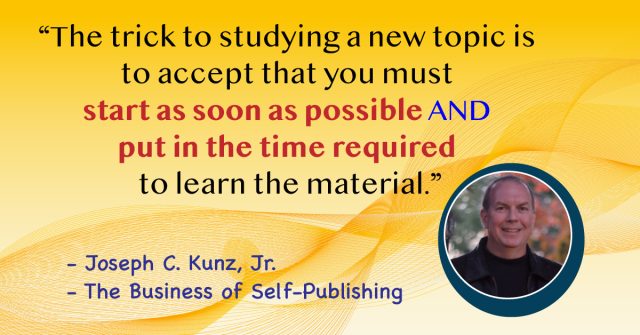Podcast: Play in new window | Download
Subscribe: Apple Podcasts | Spotify | Pandora | RSS | More
Updated September 5, 2023
Subtitle
Memorization is a necessary first step to learning
Synopsis
Memorization is the fixing of information into your memory through sheer repetition. It is a necessary first step in learning. Memorizing the fundamental terms and concepts of a complex or new topic will provide a strong foundation for a deeper understanding of the more difficult concepts that will follow with additional study.

What You Will Learn
1. You will learn what memorization is and why it is vital to learning.
2. You will learn ten tips to help set up an easy-to-follow studying system.
3. You will learn about mnemonics and how quickly you can create them.
Introduction
Memorization is the fixing of information into your memory through sheer repetition. It is a necessary first step in learning. Memorizing the fundamental terms and concepts of a complex or new topic will provide a strong foundation for a deeper understanding of the more difficult concepts that will follow with additional study.
Learning a giant, complicated, or utterly new subject might initially seem overwhelming. We have all been there before. And most of us get through it ok.
My wife Michele and I teach many healthcare professionals each year. Most are expected to quickly recall hundreds of essential dosages, formulas, and rules while dealing with stressful situations. We have learned that memorization is the fastest and most practical way to get our students started on their path to becoming great at their jobs.
Memorization, schooling, self-study, continuing education classes, online training, on-the-job training, in-house classes, and mandatory certifications all play a part in becoming very successful at almost anything.

Here is a list of our favorite tips to memorize a topic and its essential facts:
Tip # 1. Break the Material Down into Smaller Parts
Smaller bits of information will be much easier for your brain to hold onto. Make several lists. Work on memorizing these lists. Memorize a few facts, and then learn a few more.
Tip # 2. Study in Short Periods over a Long Period
Short bursts of study, fifteen or thirty minutes at a time, are much better and more productive than sitting there and studying for sixty or ninety minutes. For example, when sitting in a doctor’s waiting room, take out your study cards and read them.
These short bursts of study periods can be very productive. Constantly doing this over many months is the surest way to get the information into your long-term memory.
Tip # 3. Review the Material Frequently
You must review the material frequently to get the new information from your short-term memory into your long-term memory. The more complex the topic, and the less previous knowledge you have for an issue, the more frequently you must review the material.
Some nights, you should do a complete study session on a subject. On the other nights, you can do a quick review. But always try to touch that subject at least once every twenty-four hours.
Tip # 4. Do Not Cram
Cramming is usually useless. Learning a new or complex topic takes days, weeks, months, and years, not minutes. It takes a lot of time to process information correctly.
Tip # 5. Use Mnemonic Devices, Catchy Puns, and Phrases
Mnemonics are a great memory device to help you memorize complex information. Here is one I created to remember the stages of shock: “Not His lucky CHARMS.” Neurogenic, Hemorrhagic, Cardiogenic, Hypovolemic, Anaphylactic, Respiratory, Metabolic, Septic. You can create a mnemonic from a phrase, rhyme, or sentence.
Tip # 6. Teach the Information to Another Person
This tip is probably one of the surest ways to force yourself to learn a topic thoroughly. Get a family member, friend, or co-worker to sit and let you explain a subject to them. Have them ask you questions and put you on the spot for an understandable answer. Do not just talk to the person. Try to help them understand the subject.
Forcing yourself to explain the topic to another person will cause your brain to put the issue into a format that your brain is comfortable with. This technique will get you past simple memorization, and you will start to learn a subject.
Tip # 7. Use Various Study Materials
This tip simply means using different study materials like flashcards, videos, study guides, etc. One night, you might utilize flashcards and videos. The next night, use the textbook and your notes. Another night, use the flashcards, a study guide, etc.
Tip # 8. Leave the Radio and TV Off
You must minimize outside distractions. With all your concentration abilities, you must study the material as intensely as possible for short bursts of time. Your brain can easily handle two or three tasks at the same time. But, when studying, especially a new subject, it’s not the time to get distracted by other things.
Tip # 9. Use Study Charts and Cards
Make your study charts and flash cards. This personalization is a great way to help you recognize what information you have difficulty understanding and memorizing.
Tip # 10. Study with a Friend
This buddy system will undoubtedly make studying a complex subject much more fun. It will also be a great way to test each other. It is also a way to ensure you will learn instead of watching television.

Conclusion
Memorization is a necessary first step in learning. The trick to studying a new topic is to accept that you must start as soon as possible and put in the time required to learn the material.
Michele and I have learned that memorization is the fastest and most practical way to get our students started on their path to becoming great at their jobs. You will learn the material if you use these ten tips long enough.
Questions For Us To Think About And Discuss
1. What techniques have you used or developed to help you quickly learn a new subject?
2. What are your main distractions when you study?


